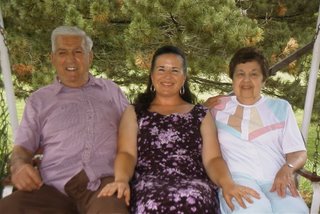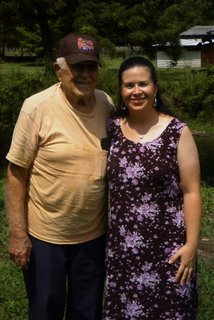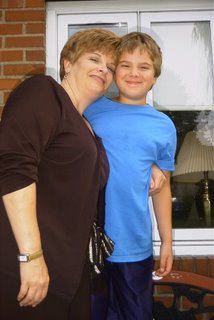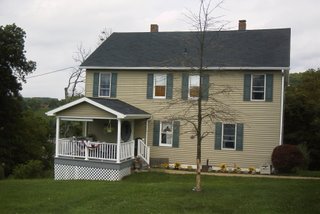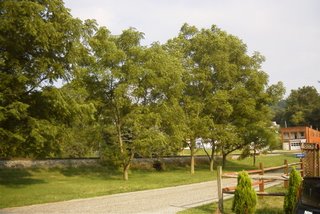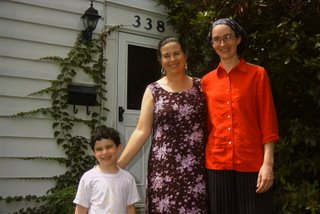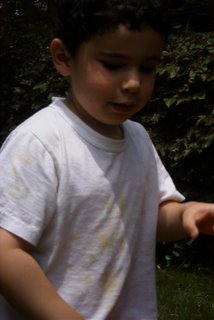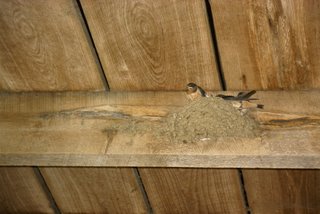Each morning here at Strangers and Guests, save Tuesday when we have Bible Study, we take a short time for prayers before beginning our work day. Each morning I find something in the Psalms we read aloud together, or the sharing of wisdom from “The Rule of St. Benedict,” which Betsy and Brian follow as Benedictine oblates, that speaks to my condition.
 (Afternoon Sky above Maloy, Iowa)
(Afternoon Sky above Maloy, Iowa)This morning in the Rule we were instructed to honor the differences we have among us, in terms of our capacities and needs, without grumbling. This idea is so radically anti-capitalist, it’s a wonder Benedictine monasteries haven’t been shut down throughout the Western world. The members of the community are instructed not to treat those who may be considered “greater” in society’s eyes with any more respect or deference than those considered “less.” More to the point, community members are instructed to give thanks if they are capable of giving or doing more, and to be humble and not self-satisfied if they can only give or do less.
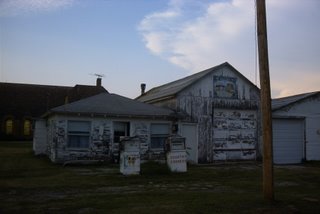 (Old gas station in downtown Maloy, Iowa, population 25)
(Old gas station in downtown Maloy, Iowa, population 25)Throughout our stay here, I have frequently felt the need to nap. Whether from our travels, my occasional anemia, the warm, humid weather, or some other cause, I am frequently tired here, in a bone-deep sort of way. Of late, I have also really felt the need to take time for myself during the workday, away from the main house, to journal, write, and think in a quiet space. I write you now from this blessed space and time.
 (Betsy Keenan saying hello to the momma goats and el gato)
(Betsy Keenan saying hello to the momma goats and el gato)What I really love about this wisdom, and am so grateful for in the philosophy of Catholic Workers, is this simple idea that you give what you can and you take what you need. We are not expected to perform, identically well, for identical workdays, each and every day, as though nothing else were going on in our lives. We are asked to work from love and desire, not from guilt, and this freedom to choose results, for me anyway, in a genuine love and desire, an honest participation in the work, rather than one filled with resentment. It also means sometimes I choose not to work, and I wrestle hard with my guilt, lack of self-worth, and workaholism in such moments. Choosing not to “work,“ and instead to write (which, of course, for a writer, is and should be considered work), I find myself immediately confronting very familiar demons. It is good, and quite empowering, to face them in such a way.
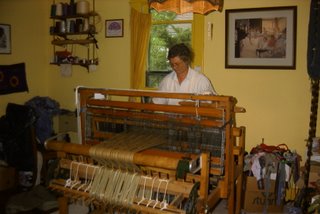 (Betsy and her old fashioned rag rug loom)
(Betsy and her old fashioned rag rug loom)I am reminded of another time I felt such welcome, acceptance and freedom: in the village of La Realidad, Chiapas, Mexico. I was blessed with the opportunity, thanks to the Indigenous Women’s Network, AFSC, and the National Commission for Democracy in Mexico, to participate in a delegation to Zapatista-held territory in the late 90s. The quality and beauty of that journey would require several entries in itself. But in relation to the current topic, I realized there, in this village of Mayan people, eeking out a living with digging sticks and rough earth, suffering daily harassment and brutalization by the Mexican army, and resisting with such dignity the neoliberal variation on the five centuries-old theme of colonial subjugation, that I felt more free than I ever had in the United States. The reason was simple. In La Realidad, everyone gave what they could and took what they needed. As a result, there was enough, for everyone, without anyone feeling so overwhelmed and exhausted he or she couldn‘t continue. It wasn’t a wealthy existence, but what there was, was shared, and no one was expected to give beyond capacity, or accumulate wealth at others’ expense and suffering. I was invited to come live in the village, with the peace campers, and work on my novel. “Oh, I couldn’t live here and not work for the village,” I replied. “Of course, you’ll work here. We know that. We know that you’ll give whatever you can--we know that you couldn’t NOT do so. But that should still leave you time to write, and rest.”
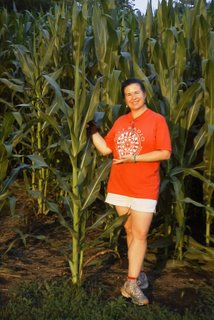 (Vanna White and Franken-corn)
(Vanna White and Franken-corn)I didn’t take them up on the offer. I should have. I still don’t have that novel written.
This morning, I am also reminded of the following poem, a gift from our dear friends Dan and Kristina in Independence, MO. I dedicate it to survivors, and to Betsy and Brian, people of such kindness, who have shared so much with us.
Kindness
by Naomi Shihab Nye
Before you know what kindness really is
you must lose things,
feel the future dissolve in a moment
like salt in a weakened broth.
What you held in your hand,
what you counted and carefully saved,
all this must go so you know
how desolate the landscape can be
between the regions of kindness.
How you ride and ride
thinking the bus will never stop
the passengers eating maize and chicken
will stare out the window forever.
Before you learn the tender gravity of kindness,
you must travel where the Indian in a white poncho
lies dead by the side of the road.
You must see how this could be you,
how he too was someone
who journeyed through the night with plans
and the simple breath that kept him alive.
Before you know kindness as the deepest thing inside,
you must know sorrows the other deepest thing.
You must wake up with sorrow.
You must speak to it till your voice catches the thread of all sorrows
and you see the size of the cloth.
Then it is only kindness that makes sense anymore,
only kindness that ties your shoes
and sends you out into the day to mail letters and purchase bread,
only kindness that raises its head
from the crowd of the world to say
It is I you have been looking for,
and then goes with you everywhere
like a shadow or a friend.
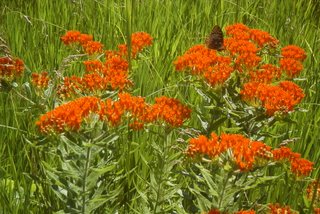 (Milkweed and Butterfly having a drink)
(Milkweed and Butterfly having a drink)
